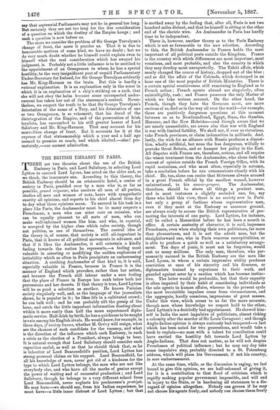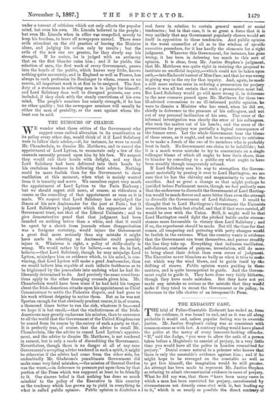THE BRITISH EMBASSY IN PARIS.
THERE are two theories about the use of the British 1 Embassy in Paris, and Lord Salisbury, in selecting Lord Lytton to succeed Lord Lyons, has acted on the older and, as we think, the inaccurate one. According to this theory, the British Embassy should be an aristocratic hotel, a centre of society in Paris, presided over by a man who is, as far as possible, grand seigneur, who receives all men of all parties, studies all men and women of note, hears with sympathetic suavity all opinions, and reports to his chief almost from day to day what these opinions mean. To succeed in his task in a place like Paris, the Ambassador must be in many respects a Frenchman, a man who can utter mots on occasion, who can be equally pleasant to all sorts of men, who can make well-informed women like him, and who, in especial, is accepted by the higher class which rules society, though not politics, as one of themselves. The central idea of the theory is, of course, that society is still all-important in Paris, that it knows of all political movements in advance, and that if it likes the Ambassador, it will entertain a kindly feeling towards the nation he represents,—a feeling most valuable in arresting or modifying the sudden explosions of irritability which so often in Paris precipitate an embarrassing situation. A soothing Ambassador of that kind is, it is said, especially valuable in France, because in France it is the manner of England which provokes, rather than her action, and because the French still labour under a sore feeling that the place of France in Europe has sunk below both her pretensions and her deserts. If that theory is true, Lord Lytton will be as good a selection as another. He knows Parisian society singularly well, and, as the language of the journalists shows, he is popular in it ; he likes life in a cultivated crowd ; he can talk well ; and he can probably sift the gossip of the hour, and catch the little important information floating about within it more easily than half the more experienced diplo- matic service. Half-Irish by birth,he has a quickness to be sought in vain among his English rivals. He would know, for example, in three days, if society knows, whether M. Gravy will resign, what are the chances of each candidate for the vacancy, and what is the direction of the influence which each Embassy, in such a crisis as the election of a President, always brings to bear. It is natural enough that Lord Salisbury should consider such capacities useful, as well as that he should think that, as he is inheritor of Lord Beaconsfield's position, Lord Lytton has strong personal claims on his support. Lord Beaconsfield, for all his knowledge of men, never got rid of a kindness for the type to which Lord Lytton belongs, the men who are not like everybody else, and who have all the marks of genius except the power of waiting and of successful production ; and Lord Salisbury, though he belongs to a very different school from Lord Beaconsfield, never neglects his predecessor's proteges. He may have—we should say, from his Indian experience, he must have—a little inner distrust of Lord Lytton ; but that
is soothed away by the feeling that, after all, Paris is not two hundred miles distant, and that he himself is sitting at the other end of the electric wire. An Ambassador in Paris has hardly time to be independent.
There is, however, another theory as to the Paris Embassy which is not so favourable to the new selection. According to this, the British Ambassador in France holds the most important of all political posts outside the Kingdom. France is the country with which differences are most important, most vexatious, and most probable, and also the country in which they may develop most unexpectedly. The Tahiti affair, which nearly changed the course of history, dropped out of the blue ; and so did the affair of the Colonels, which destroyed in an hour one of the most popular of British Ministries. There is a certain special sensitiveness still remaining in England as to French action ; French agents abroad are singularly, often unintelligibly, rash ; and France possesses the only Marine of which we take serious account. On the other hand, the French, though they hate the Germans most, are more envious of us, find us in the way all over the world—for example, there are positively dangerous questions at this moment between us as to Newfoundland, Egypt, Siam, the Gambia, Morocco, and the New Hebrides—and though aware that we are nearly unassailable, are aware also that war with England is war with limited liability. We shall not, if ever so victorious, take French provinces, or claim indemnities in milliards. And, lastly, the wish for an alliance with Russia produces a disposi- tion, wholly artificial, but none the less dangerous, wilfully to provoke Great Britain, and so hamper her policy in the East. All disputes with France are, therefore, serious, and all require the wisest treatment from the Ambassador, who alone feels the current of opinion outside the French Foreign Office, with its rapid mutations, and who must often, especially in autumn, take a resolution before he can communicate clearly with his chief. He, too, alone can excite that bitterness always aroused in a great French official by the smallest wound, however unintentional, to his anwur-propre. The Ambassador, therefore, should be above all things a prudent man, and in most instances a slightly secluded one, for, say those who hold this view, there is no society now in Paris, but only a group of factions whose representative men, even if they meet at the Embassy as common ground, are always ready to accuse the British representative of pro- moting the interests of one party. Lord Lytton, for instance, will be called a Monarchist before he has been a month in office. A certain austerity of character, it is said, impresses Frenchmen, even when studying their own politicians, far more than pleasantness, and it is not the adroit man, but the straightforward one, who in Paris removes susceptibilities, or is able to produce a quick as well as a satisfactory arrange- ment. Ten days of panic, it must not be forgotten, would cost us many millions. The only men, therefore, who per- manently succeed in the British Embassy are the men like Lord Lyons, in whom a certain impressive ability produces conviction at once of his sincerity and his firmness, or diplomatists trained by experience to their work, and guarded against error by a caution which has become instinc- tive. The latter would be preferable, but that their capacity is often impaired by their habit of considering individuals as the sole agents in human affairs, whereas in the present cycle the most irresistible impulses come from circumstances, and the aggregate, hardly conscious, impressions of great masses. Under this view, which seems to us far the more accurate, though men whose knowledge we respect hold to the other, Lord Lytton's is a decidedly bad appointment. He showed him- self in India the most impulsive of politicians, almost risking a calamity after the murder of Sir Louis Cavagnari ; and though Anglo-Indian opinion is always curiously bad-tempered--a fact which has been noted for two generations, and would take a book to explain—no man with a talent for conciliation could have excited the hostility felt towards Lord Lytton by Anglo-Indians. That does not matter, as he will not despise Frenchmen of political influence ; but he may any day take some impulsive step, probably directed to a St. Petersburg address, which will place his Government, if not his country, in sore embarrassment.
At the same time, while, as the discussion is raging, we feel bound to give this opinion, we are half-ashamed of giving it, for it is a contribution to that flood of criticism which is rapidly making popular government impossible, and will end in injury to the State, or in hardening all statesmen to a dis- regard of opinion altogether. Nobody can govern if he may not choose his-agents freely, and nobody can choose-them freely
under a torrent of criticism which not only affects the popular mind, but even hie own. Mr. Lincoln believed in the people ; but even Mr. Lincoln when in office wee compelled, merely to keep his freedom, to leave all newspapers unread. There were evils attendant on the old practice of leaving the Minister alone, and judging his action only by results ; but the evils of the new one are greater, for they slowly sap his strength. If he resists, he is judged with an acrimony that on the first blunder ruins him ; and if he yields, the selection of men, the first work of every Government, passes into the hands of the public, which knows very little, knows nothing quite accurately, and in England as well as France, has always in each profession its Boulanger to whom, reason or no reason, all important work is at first to be assigned. The first duty of a statesman in selecting men is to judge for himself ; and Lord Salisbury does well to disregard protests, our own included, if they clash with the steady convictions of his own mind. The people's nominee has usually strength, if he has no other quality ; but the newspaper nominee will usually be either the man of geniality, or the man against whom the least can be said.



















































 Previous page
Previous page